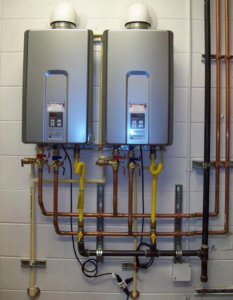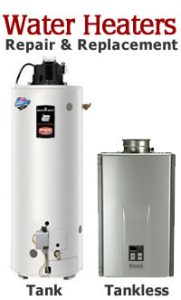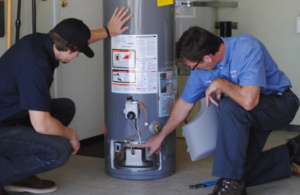 If your water heater is getting close to replacement age, you might be wondering which type of water heater is best for your Tampa home. This largely depends on your family’s water consumption and individual home’s needs. In this plumbing blog post we will analyze the advantages and disadvantages of both tankless and tank type water heaters.
If your water heater is getting close to replacement age, you might be wondering which type of water heater is best for your Tampa home. This largely depends on your family’s water consumption and individual home’s needs. In this plumbing blog post we will analyze the advantages and disadvantages of both tankless and tank type water heaters.
The advantages of a tankless water heater
Never run out of hot water. The tankless water heater will never run out of hot water. This is ideal for people who have big families because if you live in a big family, you know what it is like to be the last person in the shower. With a tankless water heater, there is also no need to wait for someone else to get done taking a shower in the other bathroom.
 Energy efficiency. In theory, tankless water heaters are better for the environment because they are more energy efficient. While a traditional tank water heater heats water continuously, tankless water heaters heat only as much water as needed, when it is needed. By heating water on demand, tankless units can reduce energy use by 24 to 34 percent compared to traditional water heater tanks.
Energy efficiency. In theory, tankless water heaters are better for the environment because they are more energy efficient. While a traditional tank water heater heats water continuously, tankless water heaters heat only as much water as needed, when it is needed. By heating water on demand, tankless units can reduce energy use by 24 to 34 percent compared to traditional water heater tanks.
Lower utility bills. Since tankless water heaters use less energy, they can also lower your utility bills. ENERGY STAR® estimates that the average household can save hundreds of dollars every year by converting to a tankless unit. Tankless water heaters can conserve almost 27 to 50 percent more energy than traditional tank models and simultaneously service every high-demand point in your home, such as the bathroom, kitchen and laundry room.
Extended Life Span. On average, tankless water heaters last five to 10 years longer than tank water heaters. With proper maintenance, a tankless water heater can offer up to 20 years of lasting use.
Save Space. Most traditional tanks hold between 40 to 60 gallons of water and usually measure about 60 inches tall and 24 inches wide. Since tankless water heaters are much smaller, they take up far less space in your home. Their standard size is 28 inches tall by 20 inches wide and 10 inches deep.
The disadvantage of a tankless water heater
 Not enough gas. Often, one disadvantage of the tankless water heater is that when converting to a tankless, most of the time the gas being supplied to the tank heater will not be enough to support a tankless. In addition, even after purchasing a tankless you will have to purchase more accessories in order to meet the warranty which means more money out of pocket.
Not enough gas. Often, one disadvantage of the tankless water heater is that when converting to a tankless, most of the time the gas being supplied to the tank heater will not be enough to support a tankless. In addition, even after purchasing a tankless you will have to purchase more accessories in order to meet the warranty which means more money out of pocket.
Tampa’s hard water issue. Tampa’s water quality is actually considered “hard” due to where its water supplies come from. The hardness of water refers to the amount of minerals in the water supply. Because 90% of Florida’s drinking water source is groundwater, that water travels over or through the ground, causing it to dissolve naturally occurring minerals such as calcium or magnesium. According to the United States Geological Services, the hardness of Tampa’s drinking water, primarily taken from the Hillsborough River, fluctuates throughout the year between about 140 to 300 parts per million or 8 to 17 grains per gallon (one grain per gallon equals 17.2 parts per million). Water is considered hard water at concentrations above 120 parts per million.
Because Tampa’s water is hard we at Cass Plumbing recommend getting a water softener if you don’t already have one before installing a new tankless water heater. Even with a water softener we also highly recommend an annual cleaning to remove mineral buildup near the heating element. This standard maintenance is easy to perform: use a vinegar solution to flush the unit for 60 minutes and remove any lingering sediment.
 Up Front Investment. A typical tankless water heater can costs three to four times more than a storage-type water heater; you’ll also pay more to install it, especially if you’re replacing a storage water heater.
Up Front Investment. A typical tankless water heater can costs three to four times more than a storage-type water heater; you’ll also pay more to install it, especially if you’re replacing a storage water heater.
Flow rate challenges. If you plan to simultaneously take showers in different bathrooms, or run a hot load of laundry while also taking a bath, your water heater could run out of steam (literally!) as it tries to keep up. Be sure your tankless water heater is sized to meet the water heating load of your home during times of peak usage. This problem can be solved by consulting with a tankless water heater professional at Cass Plumbing prior to the installation. We will evaluate your needs and recommend a tankless water heater that is large enough for your future demand.
Ventilation issues. When installing a tankless water heater one must consider proper ventilation. Often, there are additional construction costs that enter into play when installing a tankless water heater.
The advantages of a traditional tank water heater
 Lower up front costs. Storage tank water heaters can cost about 1/3rd the cost of a tankless water heater. Also, the installation costs are also significantly lower than those of tankless models because there are more issues that have to be considered when installing a tankless water heater.
Lower up front costs. Storage tank water heaters can cost about 1/3rd the cost of a tankless water heater. Also, the installation costs are also significantly lower than those of tankless models because there are more issues that have to be considered when installing a tankless water heater.
Simpler maintenance. The simplicity of storage water heaters makes for easy, low-cost repairs when needed.
Less need for a water softener. When running a traditional tank type water heater there is less demand for a water softener. Hard water will not destroy a traditional tank type water heater like it will a tankless water heater.
The disadvantages of a tank water heater
Lack of hot water. The biggest disadvantage (That every big family will tell you) is that the hot water runs out at a certain point. This means that there will be no more hot water available, and you will have to wait for it to be reheated again. Depending on how good the water heater is, this can take up to 45 minutes.
 Higher utility bills. Water in your water heater’s storage tank is constantly losing heat to its environment (we call this standing loss) – which means that your water heater has to work throughout the day to keep hot water ready for use whenever you turn on your tap, shower, or appliance. That costs you energy and money.
Higher utility bills. Water in your water heater’s storage tank is constantly losing heat to its environment (we call this standing loss) – which means that your water heater has to work throughout the day to keep hot water ready for use whenever you turn on your tap, shower, or appliance. That costs you energy and money.
Takes up more space. If you have space restrictions in your home or basement, you could find it difficult to place a 40- or 50-gallon storage tank.
Shorter lifespan. Storage tank types have a shorter useful life (about ½ the life of on-demand water heaters) – typically 10 to 15 years.
SCHEDULE A WATER HEATER CONSULTATION TODAY


Considering making the switch to a tankless water heater for your Tampa home? Contact the Tampa tankless water heater professionals at Cass Plumbing today at 813-265-9200. The experts at Cass Plumbing can help you decide if tankless water heater installation is right for you. We’ll consider all the factors, such as your family’s size and hot water usage, installation limitations, and the payback period of going tankless. With all this information, you can make the best decision for your Tampa home.






